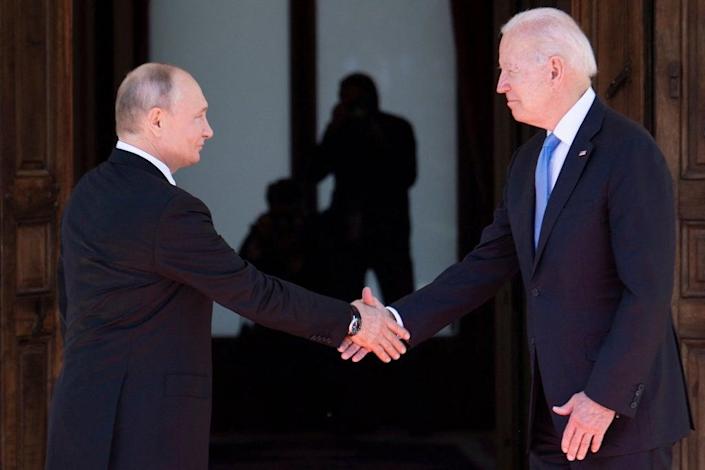
It came in the form of a breaking news alert from Moscow.
Russia had summoned the US’s ambassador and delivered a formal complaint, apparently over Joe Biden’s claim that Vladimir Putin was a “war criminal”, said the flash by the Reuters news agency.
There was more. Russia had told the American diplomat, Ambassador John Sullivan, that relations between the two countries were on the “on the verge of a breach”.
Even amid the barrage of news that Russia’s invasion of Ukraine has triggered, Monday morning’s announcement from Moscow was enough to capture people’s attention.
Was Russia really going to expel the US Ambassador, and would the United States reciprocate in kind?
Moreover what would all of that mean?
Russia and the US have never broken off their diplomatic relations
After breaking off relations with Russia after the 1917 revolution, the United States recognised the Bolshevik-led administration in 1933.
Since then, through the alliance of World War II and the worsening relations that led to the start of the Cold War, which stretched over more than four decades, the Washington and Moscow have always maintained diplomatic relations. Even during the most perilous of times – for instance during what’s known as the Cuban missile crisis of 1962 – the two sides have kept talking.
Flurry of diplomatic expulsions
Relations between the US and Russia have been getting worse for at least the last decade. Barack Obama and Putin appeared to loathe each other. While Donald Trump sought to improve relations with Moscow, the US continued to impose sanctions on Russia. Lots of Russian diplomats were expelled in the closing weeks of the Obama administration in response to Moscow’s alleged meddling the in the 2016 election.
In February 2022, Russia expelled Bart Gorman, the second-highest ranking US diplomat in Moscow.
A week later, the US announced it was in turn expelling Russia’s second-highest ranking diplomat, Sergey Trepelkov.
At the same time, the US expelled 12 Russian diplomats based at the United Nations in New York, which it claimed were intelligence agents.
Meanwhile, Bulgaria, Latvia, Lithuania and Estonia expelled a total of 20 Russian diplomats, prompting a threat of “an appropriate answer” from the Russian foreign ministry.
What is behind Russia’s formal complaint?
Last week, Joe Biden made his strongest personal denunciation of his Russian counterpart yet when he spoke at the White House.
“I think he is a war criminal,” the US president said after delivering remarks at the White House.
On Thursday, Kremlin spokesman Dmitry Peskov told reporters that Biden’s remarks were “absolutely unacceptable and inexcusable”.
The same day, America’s top diplomat, Secretary of State Antony Blinken, echoed Biden’s words.
“Yesterday, President Biden said that – in his opinion – war crimes have been committed in Ukraine. Personally, I agree,” Blinken said.
“Intentionally targeting civilians is a war crime. After all the destruction of the past three weeks, I find it difficult to conclude that the Russians are doing otherwise.”
On Monday, Russia’s foreign ministry issued a statement saying that the US ambassador was summoned, “demarched and handed a note of protest in connection with the recent unacceptable statements made by the head of the White House”.
“It is emphasised that such statements by the American president, unworthy of a statesman of such a high rank, put Russian-American relations on the verge of breaking,” it added.
“They warned that hostile actions taken against Russia would receive a decisive and firm rebuff. When discussing topical bilateral issues, the Ambassador was acutely confronted with the issue of ensuring normal working conditions for Russian diplomatic missions in the United States, including guarantees for their uninterrupted functioning.”
Russia intends to move forward with its draft UN Security Council humanitarian resolution on #Ukraine contrary to the claims of our Western partners. More details are here: https://t.co/d7v7DRcyFH
— Dmitry Polyanskiy (@Dpol_un) March 21, 2022
‘You should ask the Kremlin what message they wished to relay’
The US State Department said Sullivan, 62, whose uncle was a diplomat and was briefly held in Iran after the revolution of 1979, did meet with Russian officials.
Spokesman Ned Price said the diplomat had raised the issue of US citizens being held in Russia, including women’s basketball player Brittney Griner, and former US Marines Paul Whelan and Trevor Reed.
Asked what he believed Russia had meant when it suggested relations were on the brink, Mr Price said: “I will leave it to you to ask the Kremlin, what message it was that they may have wished to relay.”
He added: “I can tell you the message that was relayed by Ambassador Sullivan, when he met with Russian government officials.
“As you know, as a general matter, we don’t speak to every single diplomatic communication but I will say this, Ambassador Sullivan took advantage of this encounter, to demand that the Russian government follow international law and basic human decency for that matter, and allow consular access to all US citizen detainees in Russia, including those in pre-trial detention.”
Is Russia bluffing?
George Kenney, a former state department official who resigned in 1992 because he did not believe the US was taking a firm enough stance against Serbia ahead of a Balkan peace settlement, said it was common for lower ranking diplomats to be expelled by different countries.
It was rarer for their ambassador to be asked to leave, and relations cut off.
The US cut off diplomatic relations with Cuba in 1961 and restored them in 2015. During that period, Cuban and US diplomats operating in the other country worked out of Swiss-flagged facilities. The US and North Korea did not have diplomatic relations, despite Mr Trump’s visit to the demilitarised zone separating North and south Korea and his hand shake with Kim Jong-un, one of several encounters.
Mr Kenney argued the US ought to be taking the lead against Russia and ending its diplomatic relation.
“The point is, if you’re going to impose, as we have done, these terribly draconian sanctions on Russia, and with the intention of keeping them on for a very long time, it doesn’t make any sense to have normal diplomatic relations,” he told The Independent.


‘Biden has been deterred by Putin’s threats’
John Herbst served as US ambassador to Ukraine from September 2003 to May 2006. He says it pains him to see the devastation being wrought on the country.
Mr Herbst says if Russia were to break off diplomatic relations with the US it would be “unprecedented”; however he does not think it would change the broader geo-strategic picture.
He wants to see the Biden administration maintain diplomatic ties with Russia. He say the US needs to take a more forceful stance towards trying to stop Russia and diplomacy can only go so far.
“They have demonstrated the ability, to use a polite word, ‘deter’ us, to use a less polite word to ‘intimidate’, us from taking actions that are very much in our interest,” he says, speaking from Washington DC.
“I am on the record favouring humanitarian no fly zone, I am on the record in calling the administration’s decision [not to permit transfer of Polish MiGs] as disgraceful, I am on the record of saying the administration should have sent supplies of serious weapons to Ukraine back in the fall. All of which we have Ukraine in a much better place, had we done so.”
Mr Biden, along with the leaders of other Nato nations, has rejected calls from the likes of Ukraine’s leader Volodymyr Zelensky to impose a no-fly zone, out of concern about triggering a broader conflict.
He adds: “I think the Biden administration has had a decent response to Kremlin aggression, but not more than decent. Because they’ve been able to be deterred by Putin threats, and that’s a clear weakness in an otherwise solid policy.”




